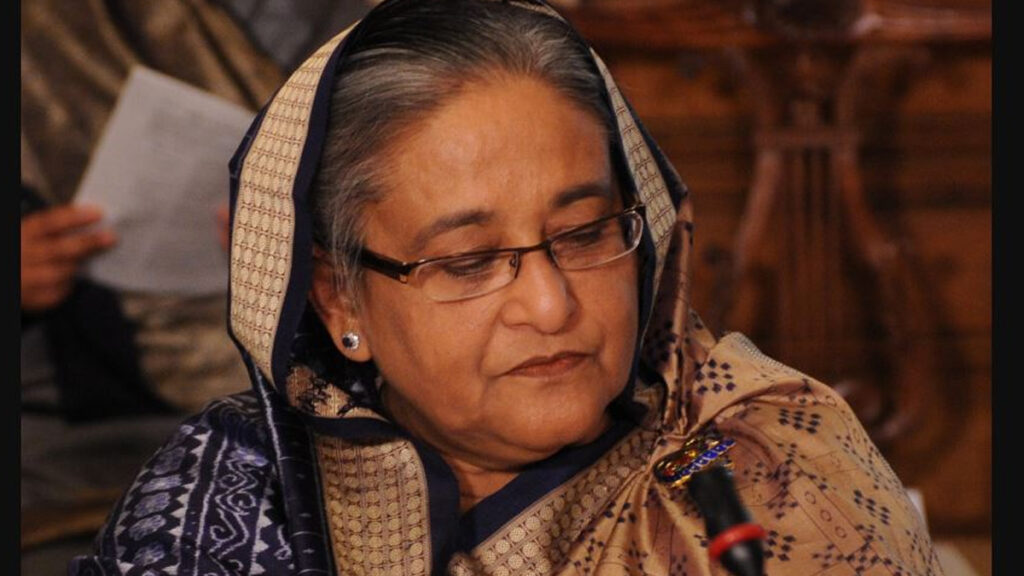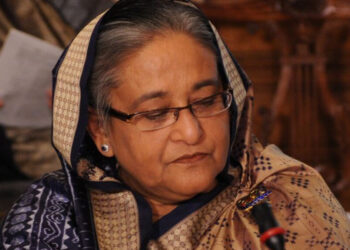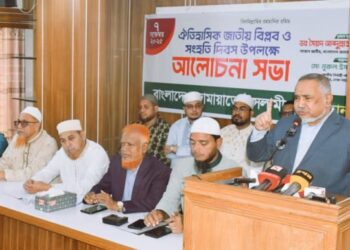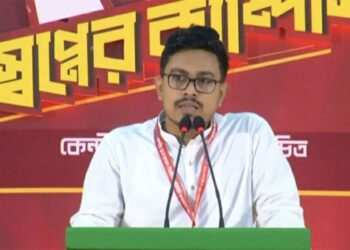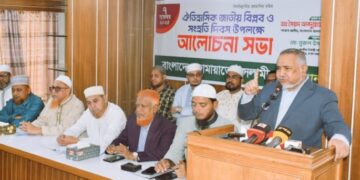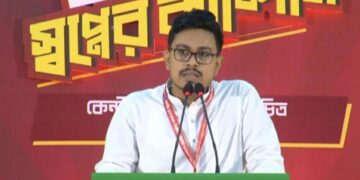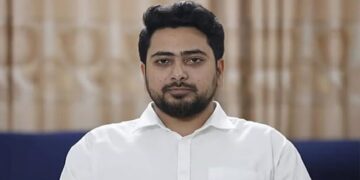Highlights
-
Ex fascist Prime Minister Sheikh Hasina, now in exile in India, denies responsibility for the July–August 2024 massacre.
-
She blames Bangladesh’s law enforcement agencies, calling the killings “mistakes made in complex situations.”
-
Forensic evidence, leaked audio recordings, and witness testimonies strongly contradict her claims.
-
Analysts believe her recent email “interviews” with Reuters, AFP, and The Independent were coordinated political propaganda.
-
Experts draw parallels between Hasina’s statements and historical examples of leaders denying accountability for state-led violence.
When Silence Breaks and Power Faces Its Reflection
Silence has finally broken. After months in exile, ex fascist Bangladeshi Prime Minister Sheikh Hasina has spoken not from Dhaka, but from India, where she now lives under growing international scrutiny.
In a rare set of email interviews with Reuters, AFP, and The Independent, Sheikh Hasina responded to allegations of mass killings during the July–August 2024 uprising that ended her 15-year rule.
Her statements read less like a confession and more like a defense brief carefully worded, emotionally distant, and aimed at reshaping a narrative that has already turned against her. What emerges is not only a political rebuttal, but the portrait of a leader struggling to control the story of her own downfall.
Sheikh Hasina’s Denial: Blame Shifted to the Enforcers
In all three interviews, Hasina firmly denied ordering security forces to open fire on protesters.
To The Independent, she claimed,
“Decisions on the ground were taken by law enforcement officers who were following established protocols. Mistakes may have occurred in complex situations.”
To AFP, she went further:
“The allegation that I personally ordered the forces to shoot is completely baseless.”
These statements follow a familiar script in the theatre of authoritarian collapse where top leaders disown their actions, passing the burden onto those who once protected them. But the evidence leaked audios, official records, and international investigations tells a very different story.
A Choreographed Interview Campaign
The striking similarity among the three interviews raised deep suspicion. How could journalists from three different outlets send nearly identical questions and receive almost identical answers?
Observers and media analysts suggest the interviews were not spontaneous journalism but part of a carefully managed PR operation, possibly coordinated by a professional communications firm.
The aim: to craft a “controlled narrative,” shielded from hard questioning, and to portray Sheikh Hasina as a misunderstood leader rather than an accused one.
Each outlet labeled their version as “Sheikh Hasina’s first interview after her fall,” implying a strategic effort to create the illusion of exclusivity while the reality was tightly scripted coordination.
Through email not live questioning she could measure every word, consult legal advice, and sculpt her defense with surgical precision. This was not journalism. It was damage control.
Mountains of Evidence Beneath the Iceberg of Denial
Sheikh Hasina’s narrative of denial is only the visible tip of a vast iceberg of evidence. According to the United Nations Human Rights Office, over 1,400 people were killed during the July–August 2024 uprising — 12 to 13 percent of them were children.
An investigation by Prothom Alo confirmed that 133 children and teenagers died — 117 of them from gunshot wounds. This was not chaos. It was a coordinated, systematic crackdown executed by the police, RAB, and Border Guard Bangladesh (BGB) actions the UN described as “widespread and methodical persecution.”
Can such a synchronized operation occur without central authorization? Could hundreds of officers, across cities, simultaneously make the same “mistake”? The logic collapses under its own weight.
The Leaked Audio That Changed Everything
The denial unraveled further when BBC Eye published a bombshell report on July 9, 2025.
It included a verified audio recording from July 18, 2024, in which Hasina’s voice could be heard saying:
“I have already given orders. Now they will use lethal weapons. Wherever they find them (the protesters), they will shoot directly.”
Forensic analysis by BBC, Al Jazeera, and independent experts confirmed the recording’s authenticity through ENF analysis — elevating it from rumor to documented confession.
Bangladesh’s CID also matched the voice to Sheikh Hasina.
Police records later showed that, following the order, military-grade Type-56 rifles were deployed in Dhaka. Was that a “field-level mistake,” or the physical manifestation of a Prime Minister’s command?
The IGP’s Statement
Further sealing the case was the testimony of former Inspector General of Police (IGP), Chowdhury Abdullah Al-Mamun, who appeared as a witness before the International Crimes Tribunal (ICT).
He stated under oath:
“On July 18, the Home Minister informed me that Prime Minister Sheikh Hasina had given direct orders to use lethal weapons.”
This testimony created a bridge between the leaked audio and the killings on the streets transforming Hasina’s denial into a hollow echo against the mountain of proof.
Read More: Jamaat Now a Major Party Like Ziaur Rahman’s BNP: Abdullah Muhammad Taher
When the Protector Becomes the Scapegoat
Hasina’s attempt to shift blame reveals not strategy but psychology the instinct of a ruler who no longer controls the narrative.
For over 15 years, the police and RAB were her instruments of political control the very pillars that maintained her regime’s iron grip. Under her watch, Amnesty International documented over 600 enforced disappearances by RAB. In 2021, the United States sanctioned RAB and several top officials for “gross human rights violations.”
Those actions were not rogue incidents; they were state policy — endorsed, defended, and rewarded by Hasina’s government.
Now, when the same forces stand accused of killing civilians, she calls it “misjudgment.” This isn’t leadership. It’s betrayal.
Political psychologists call this “Hubris Syndrome,” a phenomenon described by Lord David Owen, where prolonged power isolates a leader from reality. They begin to believe they are the state itself incapable of wrongdoing, immune to consequence.
The Politics of Exile: Rewriting the Future from Afar
Sheikh Hasina’s denials are not merely about absolution. They’re also a calculated re-entry strategy. By granting these interviews, she’s attempting to shape the narrative from exile to signal to loyalists that her political battle is not over.
Her declaration that her party would boycott future elections without her participation is not just a political statement, it’s a message of continued defiance.
“নিজেই তৈরি করুন নিজের অনলাইন স্টোর — কোনো কোডিং জ্ঞান ছাড়াই!
Through selective storytelling in foreign media, she is trying to keep the domestic scene unstable enough to remain relevant. When The Independent asked if she would apologize to the victims’ families, Sheik Hasina replied,
“I mourn every son, daughter, brother, sister, and friend our nation has lost and I will continue to do so.”
Echoes of History: The Command Responsibility
This denial is not new to history. In 1971, Pakistan’s generals denied genocide in Bangladesh, calling it “field-level mistakes.” At Nuremberg, Nazi commanders justified their crimes as “orders from above.”
Ironically, Hasina’s own government established the International Crimes Tribunal in Bangladesh to punish the Jamaat-e-Islami leaders under the same doctrine of “command responsibility.”
Back then, the court ruled that even if leaders didn’t pull the trigger, their policies, silence, or approval made them culpable.
Now, the same principle circles back to her. The ICT’s chief prosecutor recently told the tribunal:
“Sheikh Hasina was the nucleus of this operation. Such systematic killings were impossible without her direct instruction.”
History, it seems, has a cruel sense of symmetry.
Power May Flee, But Truth Follows
Sheikh Hasina’s email interviews reveal not strength, but political bankruptcy. By calling the people’s uprising a “violent rebellion,” she has tried to delegitimize a historic movement — one fueled by fifteen years of suppression, corruption, and fear.
From Abu Saeed’s bare chest on the streets to the nameless children shot in whole bangladesh every drop of blood tells the same story this was not chaos; it was state terror.
Hasina may attempt to cleanse her hands by blaming the uniforms that once served her. But the stains lie deeper in the chain of command she built, the orders she gave, and the silence she maintained.
In the end, the trigger was only an instrument. The true command rested in words “use lethal weapons” and in that moment, history recorded not just an order, but an intent. No exile, denial, or propaganda can erase that. Because truth, no matter how long it takes, always outlives power.

